

Milestones: 1750–1775. The American Revolution was precipitated, in part, by a series of laws passed between 1763 and 1775 that regulating trade and taxes.
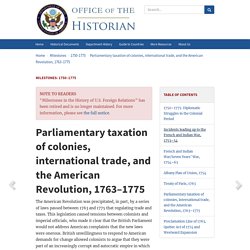
This legislation caused tensions between colonists and imperial officials, who made it clear that the British Parliament would not address American complaints that the new laws were onerous. British unwillingness to respond to American demands for change allowed colonists to argue that they were part of an increasingly corrupt and autocratic empire in which their traditional liberties were threatened. This position eventually served as the basis for the colonial Declaration of Independence. Boston Tea Party In 1763, the British government emerged from the Seven Years’ War burdened by heavy debts.
The end of the war had also brought about a postwar recession, and British merchants began to request payment for debts that colonists had incurred buying British imports. By 1774, opinion among the colonists was mixed. The Colonial Roots of American Taxation, 1607-1700. It is said that taxes are the price we pay for a civilized society.
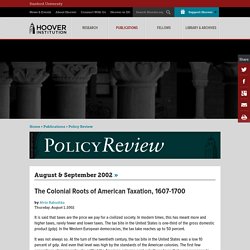
In modern times, this has meant more and higher taxes, rarely fewer and lower taxes. American Revolution: Prelude to Revolution. 1763 - The Proclamation of 1763, signed by King George III of England, prohibits any English settlement west of the Appalachian mountains and requires those already settled in those regions to return east in an attempt to ease tensions with Native Americans. 1764 - The Sugar Act is passed by the English Parliament to offset the war debt brought on by the French and Indian War and to help pay for the expenses of running the colonies and newly acquired territories.
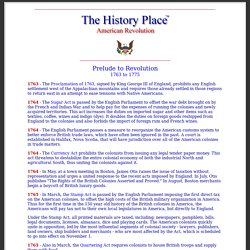
This act increases the duties on imported sugar and other items such as textiles, coffee, wines and indigo (dye).
Tea, Taxes, and the Revolution. When demonstrations erupted nationwide in March and April 2009 in opposition to the tax and spending policies of the just-inaugurated Barack Obama administration, the protesters named their movement and cause after the Boston Tea Party of Dec. 16, 1773, when Massachusetts colonists dumped British tea into Boston Harbor in the world’s most famous tax revolt.

Thus was the "Tea Party" movement reborn. The Tea Party name suggests an anti-tax protest rooted in American history and consistent with the original intent of our nation’s founding. If one is grabbing the political high ground in an American debate, this is the equivalent of placing your cannons atop Bunker Hill. (The Tea Party, it is worth noting, is assigning itself the winning team in that previous conflict.) Is the comparison accurate or invented? Americans often observe that our national independence was born of a tax revolt. Massachusetts imposed an embryonic income tax in 1634 in the form of a "faculty" tax. American Revolution - Highlights - TAXATION WITHOUT REPRESENTATION. This colored illustration, “The Stamp Act Riots at Boston, America, 1765,” initially appeared as a black-and-white drawing for the Historical Scrap Book (Cassell & Company, c 1880).
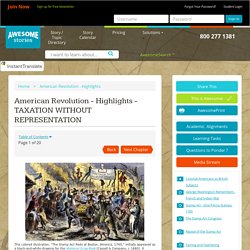
It depicts the interpretation of an artist, from the English School, who is imagining how people in Boston may have shown their displeasure against the King and Parliament when they were burdened with the stamp-act tax. For about 150 years (until 1764), the colonists not only tolerated British rule, they were proud to be British. But when the King and Parliament began to enforce trade laws and imposed taxes on sugar (to help Britain pay for the debt caused by the French and Indian War), Americans grew increasingly upset.
The Sugar Act also prohibited Americans from importing foreign rum and French wines. American Revolution for Kids: The Stamp Act. History >> American Revolution What was the Stamp Act?
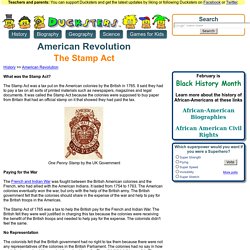
The Stamp Act was a tax put on the American colonies by the British in 1765. It said they had to pay a tax on all sorts of printed materials such as newspapers, magazines and legal documents. Tea, Taxes, and The American Revolution: Crash Course World History #28. Was the American Revolution Really about Taxes? No taxation without representation. The phrase revives a sentiment central to the cause of the English Civil War following the refusal of parliamentarian John Hampden to pay ship money tax.[1] “No Taxation Without Representation,” in the context of British American Colonial taxation, appeared for the first time in the February 1768 London Magazine’s headline, on page 69, in the printing of Lord Camden’s "Speech on the Declaratory Bill of the Sovereignty of Great Britain over the Colonies.
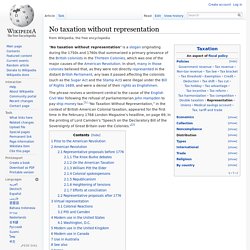
"[2] What happened to tax rates after the American Revolution? - Quora. Taxes - American Revolution. Taxes have always been used to raise revenues for war but they have also been used to help pay off the debts that arise from a war.
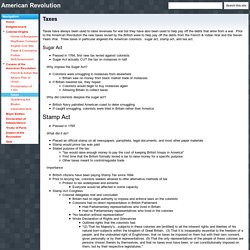
Tea, Taxes, and the American Revolution - Khan Academy. Milestones: 1750–1775.